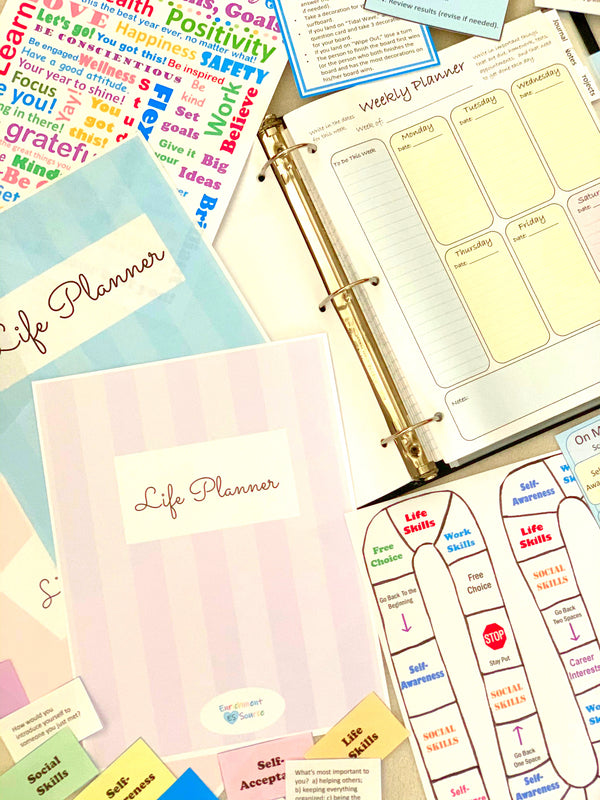October 03, 2021
Anxiety is a natural feeling or response that most people experience sometimes. We might become anxious (or have anxiety) before a big test, performance, or presentation. In fact, a little bit of anxiety in these kinds of situations can actually help us out, kind of “waking us up,” making us more alert and focused. Then we can take on that test or other challenge. Afterwards, the anxiety usually goes away.
However, sometimes we can have anxiety when we really don’t need to, or when there’s no real threat. There are also times when someone’s anxiety is too intense and overbearing. They have “too much” anxiety, and it’s not helpful. It can get in the way of doing what they want or need to do.
Instead of helping us focus on doing well on a test, anxiety can cause someone so not be able to concentrate, therefore it might make them do poorly on the test. In situations like this, anxiety is problematic and counterproductive and overwhelming. With anxiety, a little bit goes a long way! It’s helpful to learn how to manage anxiety so it doesn’t take over.
What Is Anxiety?
Anxiety is defined as the mind and body’s natural reaction/response to stressful, dangerous, or unfamiliar situations. It is an emotion, feeling, or bodily response, that most people might experience from time to time. It becomes a problem, or a disorder, when it takes over and is experienced regularly to a very high degree. The American Psychological Association (APA) defines anxiety as “an emotion characterized by feelings of tension, worried thoughts and physical changes.” Excessive anxiety can lead to many other problems.
What Anxiety Can Feel Like:
Anxiety can include feelings of fear, uneasiness, distress, discomfort, dread, excessive worry, nervousness, or restlessness. You might be tense, shaky, jittery, unfocused, or have sweaty palms, or feel like your heart is racing. You may feel threatened. You may feel apprehension about what’s to come. Many people experience anxiety in different ways.
When Anxiety Can Be a Problem
Ordinary anxiety is a feeling that comes and goes here and there, but doesn’t take over. It doesn’t get in the way of everyday life. With problematic anxiety, the fear can take over and make you afraid to do everyday things, even things you usually enjoy.
Here are Some Ways to Deal with Anxiety
When anxiety becomes much too intense and frequent than ordinary anxiety for a very long time (6 months or more) it can become an Anxiety Disorder. In these cases, feelings of anxiety are extreme, affect emotions and behavior, interfere with life, and can lead to avoiding various situations. In these cases, it is important to seek help. Encourage kids to talk to their parents, and see a medical professional. In fact, it’s a good idea to talk to someone any time you have more than just the regular “a little nervous before a test” anxiety.
The first step in managing anxiety is recognizing it. Next, there are several strategies for dealing with anxiety and worries. Here are some suggestions to share with kids and teens.
In addition to being aware of and understanding your anxiety, and once you recognize what’s causing or triggering your anxiety, work to minimize, resolve, reduce, manage, and lesson it. Is what’s causing your anxiety or worry a problem that can be solved? If so, brainstorm some ways you can solve it. Is what’s causing your anxiety something you cannot solve, something out of your control? If so, come up with ways you can cope with it.
Problem Solving
Sometimes our anxiety and worries come from problems that can be solved. When analyzing your anxiety/worry causes and triggers, determine if they are problems that you can solve (either on your own or with some help), and come up with a plan to solve them. The problem might have a simple solution or it might involve some or several steps. In any case, devise a plan, set goals, and work toward them. It may take a long time to solve, but just knowing that you’re taking action is a great step in the right direction.
Coping Skills
Sometimes, anxiety and worry come from things we can’t solve or change (at least not at that moment). They might be things not in our control. In these cases, using good coping skills or strategies is very effective. What does cope mean? To deal with something. Change your reaction or response to it. On the following page, you will find several suggestions for coping skills/strategies.
Tip
Keep a worry journal. Give yourself 10 minutes to “dump” all your worries and problems into the journal. When the 10 minutes is up, switch your focus to being proactive. Brainstorm ways you can solve and/or cope with each problem. See the worry journal page in this packet.
The Anxiety and Worry Workbook is a helpful resource to help kids deal with anxiety and worries.
This workbook, journal, planner is intended to help kids, teens, and young adults recognize, learn about, understand, and manage anxiety and worries. It includes information, tips and suggestions, worksheets, and strategies that can be used at home, school, or in therapeutic settings. It can be used on its own by anyone who has worries or anxiety, and also makes a useful tool or supplement for therapy, counseling, and mental health treatments and programs.
Order the Anxiety and Worry Workbook here.
Get a free Anxiety Coping Strategies Tip Sheet here!

Join Our Mailing List
Be the first to learn about specials and other new! Join our email list!
